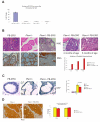Aberrant ERG expression cooperates with loss of PTEN to promote cancer progression in the prostate
- PMID: 19396168
- PMCID: PMC2835150
- DOI: 10.1038/ng.370
Aberrant ERG expression cooperates with loss of PTEN to promote cancer progression in the prostate
Erratum in
-
Author Correction: Aberrant ERG expression cooperates with loss of PTEN to promote cancer progression in the prostate.Nat Genet. 2020 Sep;52(9):984. doi: 10.1038/s41588-020-0688-0. Nat Genet. 2020. PMID: 32820258
Abstract
Chromosomal translocations involving the ERG locus are frequent events in human prostate cancer pathogenesis; however, the biological role of aberrant ERG expression is controversial. Here we show that aberrant expression of ERG is a progression event in prostate tumorigenesis. We find that prostate cancer specimens containing the TMPRSS2-ERG rearrangement are significantly enriched for loss of the tumor suppressor PTEN. In concordance with these findings, transgenic overexpression of ERG in mouse prostate tissue promotes marked acceleration and progression of high-grade prostatic intraepithelial neoplasia (HGPIN) to prostatic adenocarcinoma in a Pten heterozygous background. In vitro overexpression of ERG promotes cell migration, a property necessary for tumorigenesis, without affecting proliferation. ADAMTS1 and CXCR4, two candidate genes strongly associated with cell migration, were upregulated in the presence of ERG overexpression. Thus, ERG has a distinct role in prostate cancer progression and cooperates with PTEN haploinsufficiency to promote progression of HGPIN to invasive adenocarcinoma.
Figures




Comment in
-
Cooperativity of TMPRSS2-ERG with PI3-kinase pathway activation in prostate oncogenesis.Nat Genet. 2009 May;41(5):524-6. doi: 10.1038/ng.371. Epub 2009 Apr 26. Nat Genet. 2009. PMID: 19396167 Free PMC article.
-
TMPRSS2-ERG and PTEN loss in prostate cancer.Nat Genet. 2009 May;41(5):509-10. doi: 10.1038/ng0509-509. Nat Genet. 2009. PMID: 19399032
-
Words of wisdom. Re: Aberrant ERG expression cooperates with loss of PTEN to promote cancer progression in the prostate.Eur Urol. 2009 Nov;56(5):882-3. doi: 10.1016/j.eururo.2009.08.007. Eur Urol. 2009. PMID: 20965031 No abstract available.
References
-
- Tomlins SA, et al. Recurrent fusion of TMPRSS2 and ETS transcription factor genes in prostate cancer. Science. 2005;310:644–648. - PubMed
-
- Tu JJ, et al. Gene fusions between TMPRSS2 and ETS family genes in prostate cancer: frequency and transcript variant analysis by RT-PCR and FISH on paraffin-embedded tissues. Mod. Pathol. 2007;20:921–928. - PubMed
-
- Perner S, et al. TMPRSS2-ERG fusion prostate cancer: an early molecular event associated with invasion. Am. J. Surg. Pathol. 2007;31:882–888. - PubMed
-
- Hermans KG, et al. Two unique novel prostate-specific and androgen-regulated fusion partners of ETV4 in prostate cancer. Cancer Res. 2008;68:3094–3098. - PubMed
-
- Helgeson BE, et al. Characterization of TMPRSS2:ETV4 and SLC45A3:ETV5 gene fusions in prostate cancer. Cancer Res. 2008;68:73–80. - PubMed
Publication types
MeSH terms
Substances
Grants and funding
LinkOut - more resources
Full Text Sources
Other Literature Sources
Medical
Molecular Biology Databases
Research Materials
Miscellaneous

